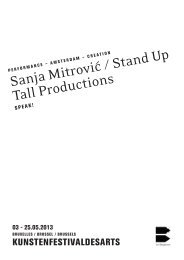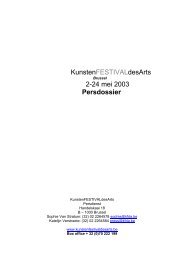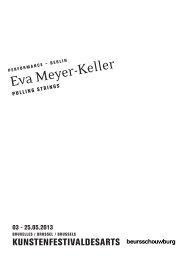Press File - Kunstenfestivaldesarts
Press File - Kunstenfestivaldesarts
Press File - Kunstenfestivaldesarts
Create successful ePaper yourself
Turn your PDF publications into a flip-book with our unique Google optimized e-Paper software.
ihn! Murx ihn! Murx ihn ab! [Kill the European! Kill him! Kill him! Kill him! Kill him off!] at the<br />
Berliner Volksbühne must repeatedly run to a washroorn when signalled and then sit clown<br />
again at their respective, single tables. A clock hanging on the wall shows that no time has<br />
elapsed. Qualitatively speaking, nothing changes in the lives of these people who are locked up<br />
in oversized rooms. But in dreams or memories they fall out of their routine. Toward the end of<br />
the production of Kill the European, which has been called a requiem to the GDR, there is a<br />
moment in which the obligatory duty of waiting and repeating is suspended. Two of the actors<br />
begin to play klezmer music, at first very softly, then filling the whole room. The supposed<br />
standstill in which the music itself takes over the tempo is memory-time. It is a rip in the<br />
established course of time which frees up recollection.<br />
Walter Benjamin distinguished between ‘empty’ and ‘filled’ time. Empty time is the present<br />
sequence, a serial time without history. Filled time is time charged with a past and a future. In<br />
Marthaler's theatre, it is mostly the music which allows time to be filled. It produces an<br />
unconscious state, similar to dreaming and sleeping. When people sleep in Christoph<br />
Marthaler's productions, it means more than merely a dramaturgical device. Sleep refuses to be<br />
fixed in time. Sleep relieves the strain of meaning. In sleep and dreams the figures on stage can<br />
express a different possibility of their existence which does not occur in their present now: what<br />
else people could be, if they could. Sleeping, dreaming, daydreaming, these defensive,<br />
persistent activities are in Marthaler's theatre emblematic states of people. Sleep relieves the<br />
burden of intentional speaking; it has no goal; it dilates time.<br />
Even the theatre always has to remember the theatre. The spaces are remembered spaces.<br />
The people are remembered and dreamt people. The sentences which they utter are not<br />
available as a matter of course. They are residual pieces of speech, which have been left<br />
behind after great accidents. Anna Viebrock dresses these people in various, more recent and<br />
older pasts. One has the feeling of having seen them before on the street, though perhaps not<br />
today. In this belated perspective nothing can be taken for granted any longer. All of Marthaler's<br />
works have this perspective: nothing is, rather it just passed or will become. Something ended<br />
and the ‘becoming‘ can be no new assertion. One always sees and hears traces. This temporal<br />
shift is the point of departure of narrative.<br />
Marthaler's theatre is a theatre of victims, never one of perpetrators. His characters are the kind<br />
who withdraw. They do not even want to be on stage. If they get caught up in an activity, they<br />
find themselves in a dilemma and search for a way out. It is therefore natural that this theatre is<br />
slow. In an epoch in which speed is a powerful social value and in which one can be<br />
everywhere at once and see everything at once, slowness as an aesthetic structure is a<br />
provocation. For the strong are celebrated as those who have done away with time as duration<br />
and passage. Here is a theatre which above all else through its rhythm says: I do not belong.<br />
And this slowness is more than a style and more than a theme. Here is a director who takes his<br />
time, who can wait for the actors and who can therefore observe what they do. The same<br />
freedom and energy of observation emerge in the dilated spaces of time on stage as an overprecise<br />
and over-concrete observation of life.<br />
Christoph Marthaler has made time experienceable once more as an object in his theatre.<br />
Slowness and repetition produce a rhythm which tells something about social life. Slow life is<br />
long. People wait their entire life for something that never comes to them. In an obsessive-<br />
compulsive arrangement they repeat similar activities. Then a brief, dramatic disturbance occurs<br />
because a flowerpot falls over or a glass breaks, after which they return to their former, humble<br />
attitudes. For his piece Vexations Eric Satie called for a piano composition to be repeated four<br />
hundred and eighty times in a row. Marthaler used Vexations in his Hamburg production of<br />
'Faust' as a music of endlessness, because people are endlessly trying to be happy.<br />
That is an abbreviation of the life of those whom life left behind. “And life continues, as if one<br />
had never been there…’, says Karoline in Marthaler’s production of Ödön von Horvath’s Kasmir<br />
and Karoline. The world of images and lived experience drift a part. In the end, the optimistic<br />
neon writing and blithe cheerfulness are confused with life. And everyone believes that he alone<br />
is once again being left behind by life. Horvath 's fair-ground idea in Kasimir and Karoline<br />
means the fiction of life. The rides and roller coasters are concentrations of speeds against<br />
which is juxtaposed the slow language of those who cannot afford admissions-tickets for them.<br />
10






